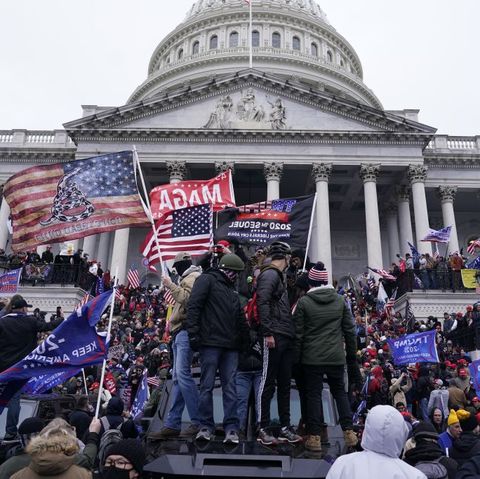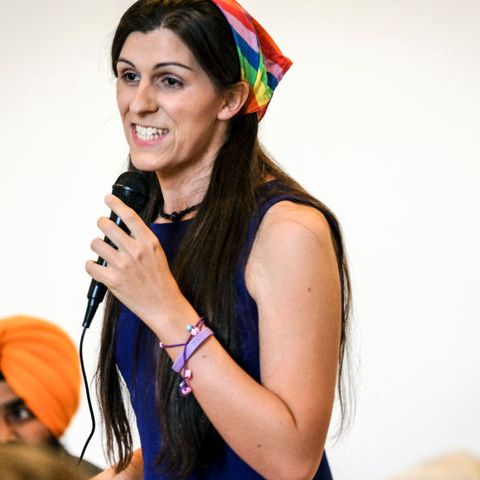Last week marked the one-year anniversary of the Jan. 6 insurrection on the Capitol—an eerie day for so many who watched, on TV or online, as violent extremists stormed the halls of Congress, set up gallows outside the building, broke glass, waved treasonous symbols, and threatened the lives of our leaders. Nine people died during and after that day, including multiple members of the Capitol police force, some by suicide.
It felt dystopian—like a scene from a movie.
But it was very real, very scary, and unfortunately, neither the epilogue nor even the climax of the fight against democracy.
According to research from the database Insurrection Index, 222 people who participated in the Jan. 6 Capitol attack are either elected officials or currently running for office. Hundreds more local Republican Party leaders and influential stakeholders enabled or encouraged the riot. And since that day, those same people and their networks have redirected their anger at local governments, protesting school boards, city councils, county health boards, and other local officials. As one protester told NBC News: “We figured out that going to the Capitol and working that particular piece doesn’t do anything, because these legislators have already made up their mind. It’s all about local legislation, your local school districts, your City Council Board of Supervisors. These people live in our community. They work here, and they’re going to have to face us every single day.”
Far-right extremists like QAnon followers, the Proud Boys, and the Oath Keepers—along with Trump acolytes and Steve Bannon-enthusiasts—are focusing all their energy on local government.
They’re not even being secretive about it. On the top of a QAnon forum, there was a direct message encouraging supporters to run for local office. On Steve Bannon’s podcast each week, he encourages his listeners to get engaged locally, especially for positions that help administer elections. The Proud Boys’ national chairman has also directed his members to focus their efforts locally.
These people are trying to build long-term, sustainable power from the ground up. Once they take over school boards and city councils, they can determine what kids learn, how towns are governed, and ultimately rewrite the rules to ensure no pro-democracy leader can win national power again, let alone a leader who cares about things like raising the minimum wage, accessible health care, affordable child care, reproductive health access, LGBTQIA+ equality, racial justice, or anything else that might make life better for so many people. And once they’ve gained a modicum of credibility as members of school boards or city councils, they can more easily run for governor, or Congress, or president.
You might be feeling hopeless, like nothing can be done to stop the onslaught of extremism and it’s all out of our control. It’s hard to see how one person can take on this big, messy, monstrous movement. Hell, it’s hard to see how even the United States government in its current makeup can stop it.
But we can, and we must. Consider it this way: The far-right is trying to win big by winning small. But pro-democracy forces can win big by winning small, too. You specifically can win small by running for local office in your community.
Even if you have no experience in politics, or you’re an introvert, or you don’t have a ton of spare cash, or you’ve got purple hair and tattoos, or you feel like an imposter when you talk about policy ideas: You can run for local office and win. As one of the co-founders of Run for Something, I can prove it. My organization has helped elect 637 young people—mostly women and people of color and about a quarter LGBQTIA+ folks, spread across 48 states—win local offices for the very first time.
We helped a young gay AAPI man beat a Proud Boys leader in Hawaii and a college student beat an 20-year incumbent in Connecticut. We helped elect the first Somali American to the city council in Lewiston, ME, the first Indian American woman to serve in local office in the entire state of South Carolina, and multiple leaders who became the first openly trans people elected to their respective state legislatures. Over the years, we’ve worked with young parents, non-binary folks, veterans, people with disabilities, musicians, artists, doctors, and candidates with all kinds of non-traditional backgrounds.
Running for office is hard and absolutely requires sacrifices. But it is also one of the most worthwhile things you can do for yourself, your community, and your democracy. School boards determine so much about how our kids are educated; city and county councils dictate the kind of streets we drive or walk or cycle on and whether our trash gets picked up; state legislatures control everything from voting rights to climate to criminal justice issues. Local election authorities decide how accessible the polls are; library boards make decisions about what kinds of books our communities have free access to; conservation boards determine how we value our environment. While it might feel like Congress just languishes, local governments actually accomplish things—and when good people serve in them, those things make all our lives better.
If you do want to run for office, in 49 states it’s not too late to file to get on the ballot in 2022. (And if not in 2022, maybe in 2023 or 2024!) You can look up what’s on the ballot to run for at runforwhat.net; even if you don’t meet Run for Something’s specific criteria, we’ll direct you to the right partners who can help you. We’ll walk you through everything from how to pick what office to run for to how to plan a campaign to what to do post-Election Day.
This is a make-or-break moment for our democracy, and it might feel like there’s no cavalry coming to save us. See it as an opportunity: We are the cavalry, and we have to save ourselves.
This content is created and maintained by a third party, and imported onto this page to help users provide their email addresses. You may be able to find more information about this and similar content at piano.io


